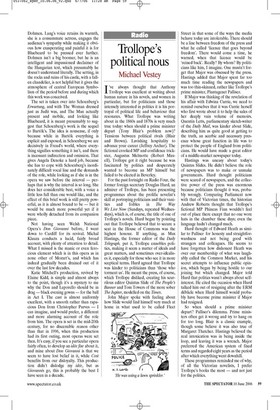Radio
Trollope’s political nous
Michael Vestey
I’ve always thought that Anthony Trollope was excellent at writing about human nature in his novels, and women in particular, but for politicians and those intensely interested in politics it is his portrayal of political life and behaviour that resonates. What Trollope was writing about in the 1860s and 1870s is very much true today: when should a prime minister depart (Tony Blair’s problem now)? Tensions between political rivals (Blair and Brown). Lavishing hospitality to advance your career (Jeffrey Archer). The fictional crooked MP and confidence trickster, Augustus Melmotte (Robert Maxell). Trollope got it right because he was fascinated by politics and desperately wanted to become an MP himself but failed to be elected in Beverley.
For the past fortnight on Radio Four, the former foreign secretary Douglas Hurd, an admirer of Trollope, has been presenting programmes about the prolific novelist’s skill at portraying politicians and their vanities and foibles in The Way We Live Now (Sundays, repeated Wednesdays), which is, of course, the title of one of Trollope’s novels. Hurd began by pointing out that Trollope believed that to secure a seat in the House of Commons was the highest honour. If anything, as Max Hastings, the former editor of the Daily Telegraph, put it, Trollope ennobles politics, making it seem a matter of ideals and great matters, and sometimes over-idealises it, especially for those who see it in more sceptical terms. Hurd agreed that Trollope was kinder to politicians than ‘those who torment us’. He meant the press, of course, which Trollope disliked, creating his scurrilous editor Quintus Slide of The People’s Banner and Tom Towers of the more sober The Jupiter, modelled on the Times.
John Major spoke with feeling about how Slide would find himself very much at home in what used to be called Fleet Street in that some of the ways the media behave today are intolerable. There should be a line between freedom of the press and what he called ‘licence that goes beyond freedom’. There would come a time, he warned, when that licence would be ‘reined back’. Really? By whom? By politicians like him, I imagine. One mustn’t forget that Major was obsessed by the press. Hastings added that Major spent far too much time reading the newspapers and was too thin-skinned, rather like Trollope’s prime minister, Plantagenet Palliser.
If Major was thinking of the revelation of his affair with Edwina Currie, we need to remind ourselves that it was Currie herself who first wrote about it to help the sales of her deeply vain volume of memoirs. Quentin Letts, parliamentary sketch-writer of the Daily Mail, was kinder about Slide, describing him as quite good at getting to the truth, an acerbic and necessary presence whose great function in life was to protect the people of England from politicians. He would have made a great editor of a middle-market newspaper today.
Hastings was uneasy about today’s Quintus Slides. He didn’t believe the role of newspapers was to make or unmake governments. Hurd thought politicians were scared of newspapers, and the collective power of the press was enormous because politicians thought it was, probably wrongly. Comparing Parliament now with that of Victorian times, the historian Andrew Roberts thought that Trollope’s fictional MP Phineas Finn wouldn’t feel out of place there except that no one wore hats in the chamber these days; even the language hadn’t changed much.
Hurd thought of Edward Heath as similar to Palliser for honesty and straightforwardness and not being good with strangers and colleagues. He seems to have forgotten how dishonest Heath was over our membership of what was laughably called the Common Market, and his secret attempts to influence public opinion, which began by being hostile to our joining but which changed. Major told Hurd that politics wasn’t always about selfinterest. He cited the occasion when Hurd talked him out of resigning after the ERM débâcle when Hurd himself would probably have become prime minister if Major had resigned.
So when should a prime minister depart? Palliser’s dilemma. Prime ministers often get it wrong and try to hang on for too long. Blair is a classic example, though some believe it was also true of Margaret Thatcher. Hastings believed the real intoxication was in being inside the loop, and leaving it was a wrench. Major preferred the American system of fixed terms and regarded eight years as the period after which everything went downhill.
These programmes reminded me of why, of all the Victorian novelists, I prefer Trollope’s books the most — and not just for the politics.


















































































 Previous page
Previous page